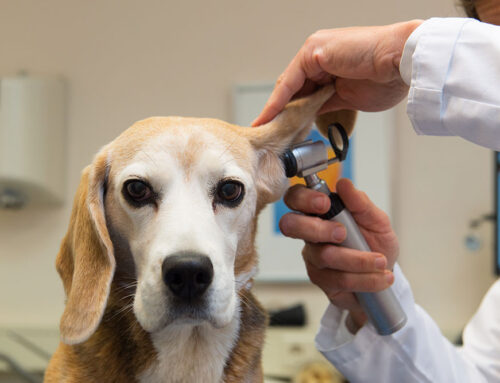Your pet’s immune system typically works to protect them against infection and disease. However, the immune system can be sensitized to a substance, resulting in an overreaction. Most allergic reactions occur when allergen protein molecules combine with antibodies in the blood and attach to mast cells, which are found in many tissues throughout the body. This attachment results in the mast cells releasing histamine that causes local inflammation and the signs typically associated with an allergic reaction. Allergies are common in pets, and our team at Palm City Animal Medical Center wants to help by explaining how your pet may be affected.
Allergic signs in pets
While some pets may experience respiratory issues, such as coughing, sneezing, or a runny nose, when affected by an allergy, the majority suffer from excessively itchy skin that can affect one area of the body (localized) or their entire body (generalized). Signs typically include obsessive scratching, chewing, licking, and rubbing. Skin lesions, such as redness, crusty papules, excoriations, and hair loss, may be present, too. Many allergic pets also experience chronic skin and ear infections. Pets affected by food allergies may suffer from gastrointestinal problems, including vomiting, diarrhea, and excess gas.
Insect bite allergies in pets
Pets can have an exaggerated inflammatory response to the bite or sting of an insect or arachnid, including spiders, ticks, fleas, blackflies, deer flies, horseflies, ants, bees, hornets, and wasps. Flea saliva is the most common allergy in pets, and the bite from a single flea can cause a severe reaction. While medications such as steroids and anti-itch medications can be prescribed to address the reaction, the only effective way to manage flea allergy dermatitis is to remove all fleas from your pet and their environment. Once that happens, your pet should remain on a year-round flea prevention medication to prevent recurrence.
Food allergies in pets
Pets can develop an allergy to any protein or carbohydrate in their food, but protein sources are the most common culprit. Beef, dairy products, chicken, eggs, and fish are ingredients that commonly cause allergies in pets. Your pet can develop a food allergy at any age, and they can become allergic to a food they’ve been eating for years. Food allergies typically don’t respond well to medications, and the best treatment is to identify the offending ingredient and eliminate it from their diet. A food elimination trial using a hypoallergenic diet or a hydrolyzed diet is the most accurate way to diagnose a food allergy. During the trial, your pet must eat food exclusively from the special diet for at least eight weeks. If other food, such as table scraps, treats, or medicated chews, is ingested during this time, the test will be invalid. If your pet’s signs resolve while on the trial diet, they can be challenged with ingredients from their original diet to determine what is causing their reaction. This ingredient should be eliminated from their diet to prevent recurrence.
Environmental allergies in pets
Environmental allergies in pets are called atopy. The most common allergens that affect pets include tree pollens, grass pollens, weed pollens, molds, mildews, and house dust mites. Depending on the offending allergen, your pet’s signs may be seasonal, and most pets start showing signs between the ages of 1 and 3. Atopy can be diagnosed using allergy testing that involves intradermal skin or blood tests to determine what allergens are causing the reaction. Treatment is typically multimodal and includes:
- Hyposensitization therapy — If allergy testing is performed, the information can be used to produce allergy shots. These injections or oral medication, will be given to your pet in gradually increasing doses to desensitize them to the offending allergen. About 50% of pets experience significant improvement with this therapy; in 25% more, the therapy results in reduced amounts of steroids needed to control their signs. However, it can sometimes take months to achieve this relief.
- Corticosteroids — Steroids frequently are used to control acute inflammation from an allergic reaction, but these medications can cause problematic side effects if administered long term.
- Anti-itch medications — Numerous anti-itch drugs are available to help relieve your pet’s distress, and our veterinary professionals will determine what product is best for them.
- Shampoo therapy — Weekly bathing with a mild shampoo can sooth itchy, inflamed skin and remove allergens that can be absorbed through the skin.
- Fatty acid supplementation — Omega-3 fatty acids can improve the skin’s natural oil barrier, decreasing inflammation.
Contact allergies in pets

Contact allergies are the least common allergies diagnosed in pets. A contact allergy occurs when your pet is allergic to a substance they directly contact. Common offenders include pyrethrins found in flea collars, materials used in carpets or bedding, and pesticides used on the lawn. Typically, the skin that contacts the substance becomes irritated and itchy. Identifying and removing the allergen resolves the problem.
Pets also can be affected by more than one allergy, and atopic pets are at higher risk for insect bite and food allergies. This can make diagnosis and treatment challenging, and these pets will need lifelong therapy to manage their signs.
Allergies are a concerning issue for pets and pet owners, but appropriate diagnosis and treatment can significantly alleviate signs. If you believe your pet has an allergy, contact our American Animal Hospital Association (AAHA)-accredited team at Palm City Animal Medical Center so we can determine what is causing their reaction.








Leave A Comment